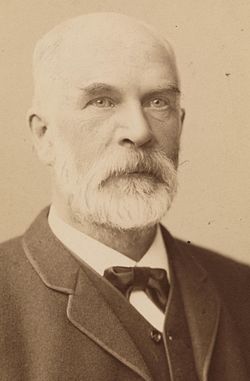Cato Maximilian Guldberg
Norwegian mathematician and chemist From Wikipedia, the free encyclopedia
Cato Maximilian Guldberg (11 August 1836 – 14 January 1902) was a Norwegian mathematician and chemist. Guldberg is best known as a pioneer in physical chemistry.[1][2]
Cato Maximilian Guldberg | |
|---|---|
 Cato Maximilian Guldberg (1891) | |
| Born | 11 August 1836 |
| Died | 14 January 1902 (aged 65) Christiania, Norway |
| Alma mater | Royal Frederick University |
| Known for | Law of mass action |
| Awards | Order of St. Olav Order of the Dannebrog Order of Vasa Order of the Polar Star Order of Charles XIII |
| Scientific career | |
| Fields | Mathematics Chemistry |

Background
Guldberg was born on 11 August 1836, in Christiania. He was the eldest son of Carl August Guldberg (1812–92) and Hanna Sophie Theresia Bull (1810–54). He was the brother of nurse and educator Cathinka Guldberg as well as mathematician Axel Sophus Guldberg. He attended Aug. Holths private latinskole in Christiania. Guldberg studied mathematics and physics at the University of Christiania and took his diploma in 1859. That same year he received the Crown Prince's gold medal (Kronprinsens gullmedalje) for a dissertation in pure mathematics. He received a travel and education scholarship in 1861, studying applied mathematics and machine learning in what is now Germany, Switzerland and France.[3][4]
Career
Guldberg first taught at Hartvig Nissens skole in Christiania. Gulberg worked at the Royal Frederick University becoming a college fellow in 1867 and received a professorship in applied mathematics in 1869. Together with his brother-in-law, Peter Waage, he proposed the law of mass action. This law attracted little attention until, in 1877, Jacobus Henricus van 't Hoff arrived at a similar relationship and experimentally demonstrated its validity.[5][6]
In 1890, he published what is now known as the Guldberg rule, which states that the normal boiling point of a liquid is two-thirds of the critical temperature when measured on the absolute scale.[7]
From 1866 to 1868, 1869 to 1872 and 1874 to 1875, he was the chairman of the Norwegian Polytechnic Society.[8]
Honours

 Sweden-Norway:[9]
Sweden-Norway:[9]
- Knight of the Order of Vasa, 1866[10]
- Knight of the Polar Star, 1882
- Knight of St. Olav, 1891; Commander 2nd Class, 21 January 1896
- Knight of the Order of Charles XIII, 28 January 1899
 Denmark: Knight of the Dannebrog, 30 August 1872[11]
Denmark: Knight of the Dannebrog, 30 August 1872[11]
References
Publications
Related reading
External links
Wikiwand - on
Seamless Wikipedia browsing. On steroids.
